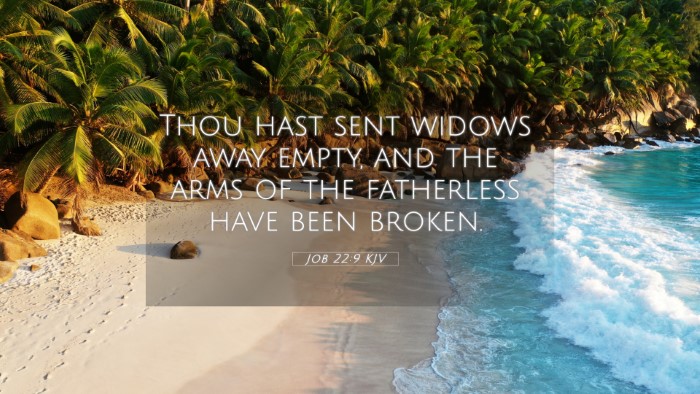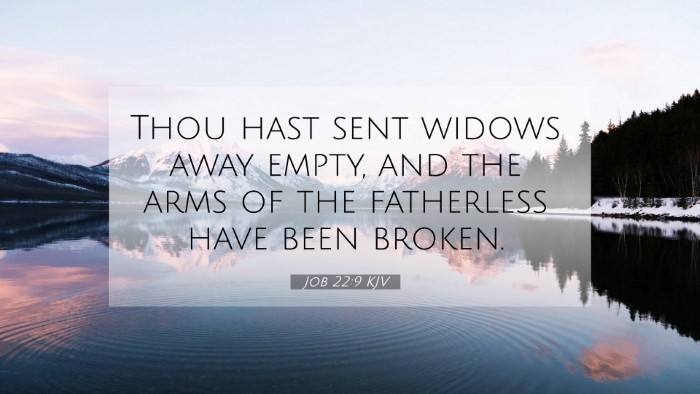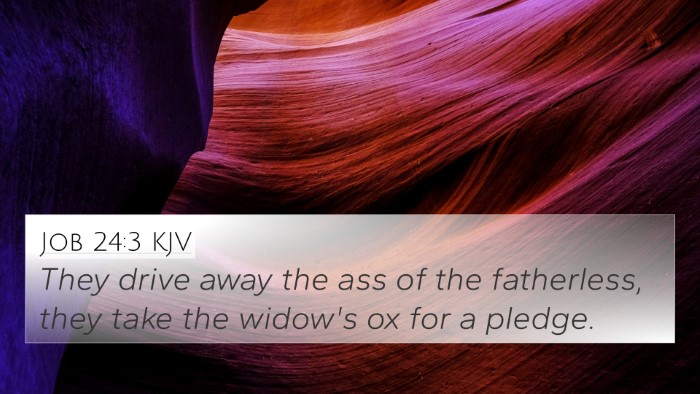Old Testament
Genesis Exodus Leviticus Numbers Deuteronomy Joshua Judges Ruth 1 Samuel 2 Samuel 1 Kings 2 Kings 1 Chronicles 2 Chronicles Ezra Nehemiah Esther Job Psalms Proverbs Ecclesiastes Song of Solomon Isaiah Jeremiah Lamentations Ezekiel Daniel Hosea Joel Amos Obadiah Jonah Micah Nahum Habakkuk Zephaniah Haggai Zechariah MalachiJob 22:9 Similar Verses
Job 22:9 Cross References
Thou hast sent widows away empty, and the arms of the fatherless have been broken.
Uncover the Rich Themes and Topics of This Bible Verse
Listed below are the Bible themes associated with Job 22:9. We invite you to explore each theme to gain deeper insights into the Scriptures.
Job 22:9 Cross Reference Verses
This section features a detailed cross-reference designed to enrich your understanding of the Scriptures. Below, you will find carefully selected verses that echo the themes and teachings related to Job 22:9 KJV. Click on any image to explore detailed analyses of related Bible verses and uncover deeper theological insights.
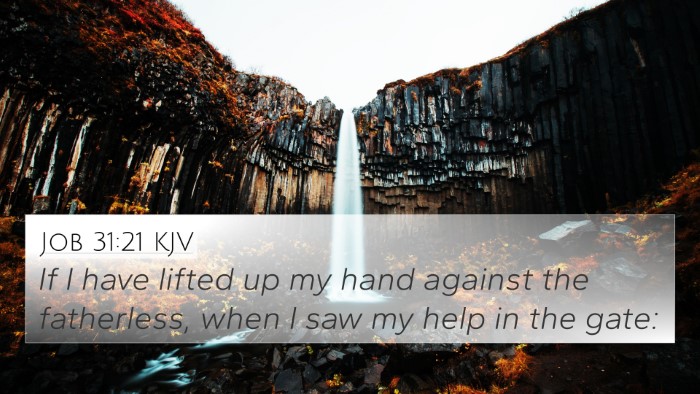
Job 31:21 (KJV) »
If I have lifted up my hand against the fatherless, when I saw my help in the gate:
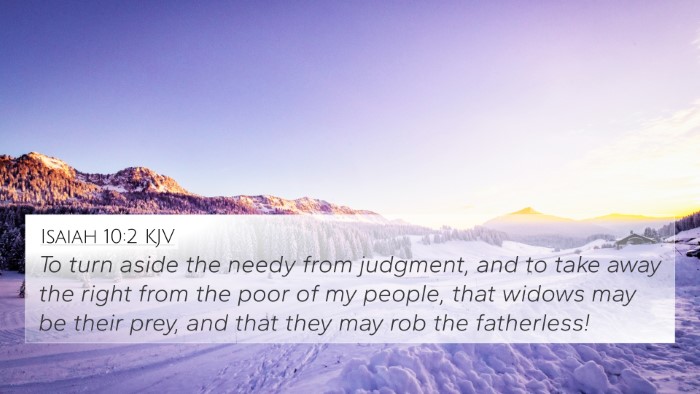
Isaiah 10:2 (KJV) »
To turn aside the needy from judgment, and to take away the right from the poor of my people, that widows may be their prey, and that they may rob the fatherless!
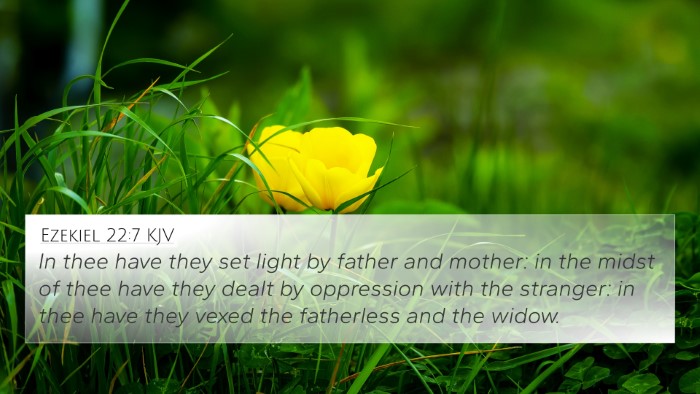
Ezekiel 22:7 (KJV) »
In thee have they set light by father and mother: in the midst of thee have they dealt by oppression with the stranger: in thee have they vexed the fatherless and the widow.
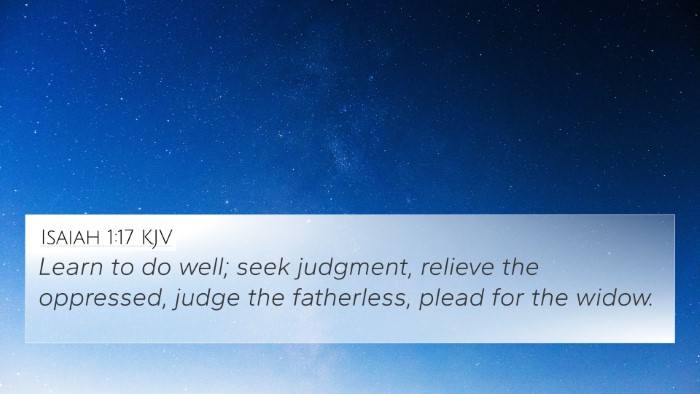
Isaiah 1:17 (KJV) »
Learn to do well; seek judgment, relieve the oppressed, judge the fatherless, plead for the widow.
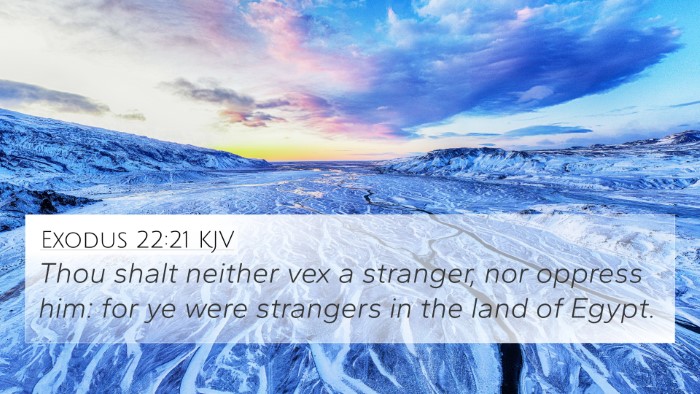
Exodus 22:21 (KJV) »
Thou shalt neither vex a stranger, nor oppress him: for ye were strangers in the land of Egypt.

Ezekiel 30:22 (KJV) »
Therefore thus saith the Lord GOD; Behold, I am against Pharaoh king of Egypt, and will break his arms, the strong, and that which was broken; and I will cause the sword to fall out of his hand.
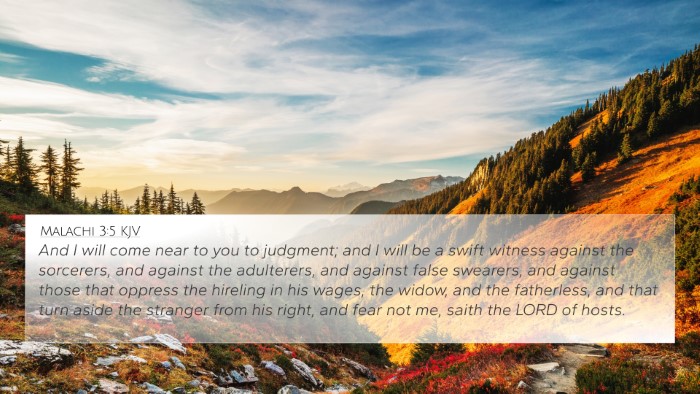
Malachi 3:5 (KJV) »
And I will come near to you to judgment; and I will be a swift witness against the sorcerers, and against the adulterers, and against false swearers, and against those that oppress the hireling in his wages, the widow, and the fatherless, and that turn aside the stranger from his right, and fear not me, saith the LORD of hosts.
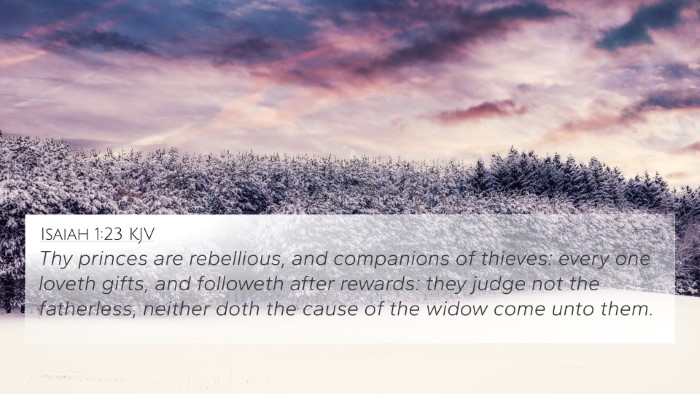
Isaiah 1:23 (KJV) »
Thy princes are rebellious, and companions of thieves: every one loveth gifts, and followeth after rewards: they judge not the fatherless, neither doth the cause of the widow come unto them.
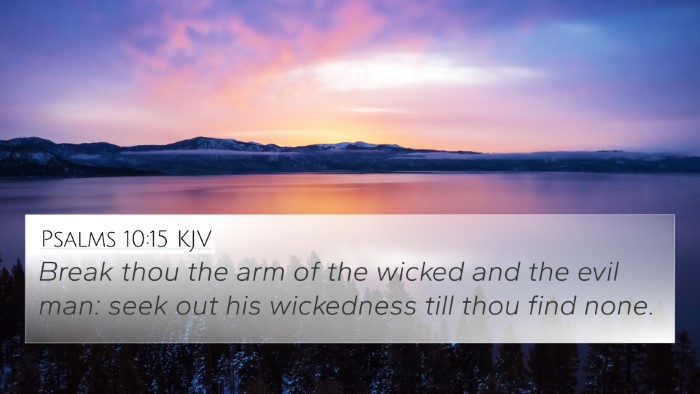
Psalms 10:15 (KJV) »
Break thou the arm of the wicked and the evil man: seek out his wickedness till thou find none.

Psalms 37:17 (KJV) »
For the arms of the wicked shall be broken: but the LORD upholdeth the righteous.
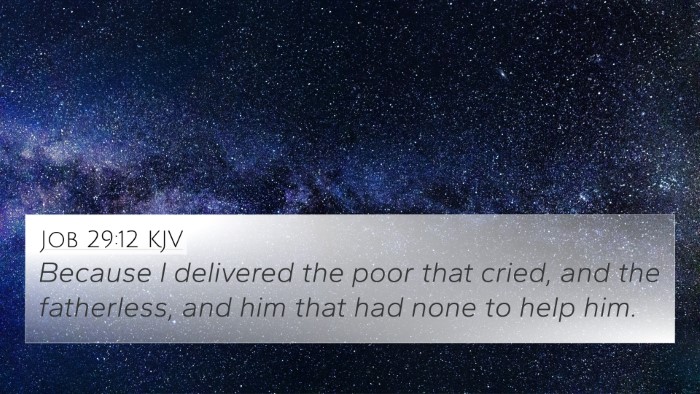
Job 29:12 (KJV) »
Because I delivered the poor that cried, and the fatherless, and him that had none to help him.
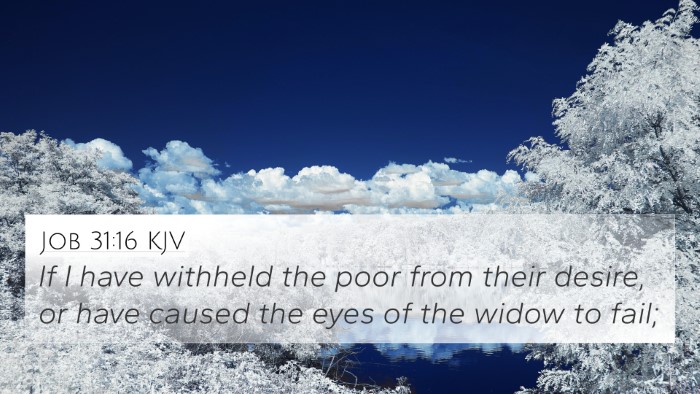
Job 31:16 (KJV) »
If I have withheld the poor from their desire, or have caused the eyes of the widow to fail;
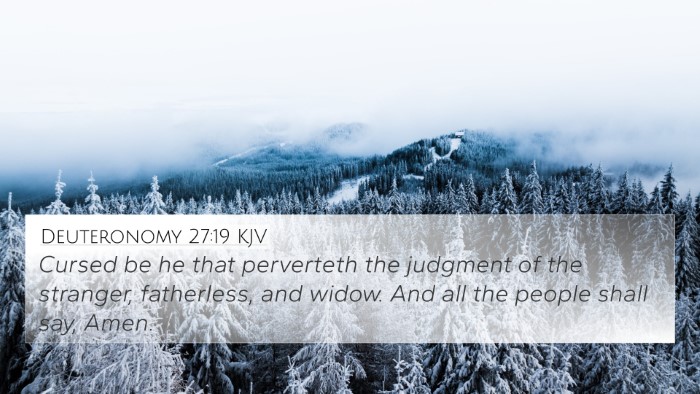
Deuteronomy 27:19 (KJV) »
Cursed be he that perverteth the judgment of the stranger, fatherless, and widow. And all the people shall say, Amen.
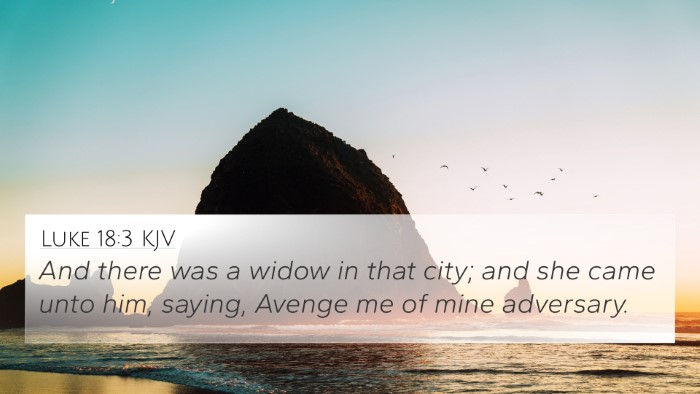
Luke 18:3 (KJV) »
And there was a widow in that city; and she came unto him, saying, Avenge me of mine adversary.
Job 22:9 Verse Analysis and Similar Verses
Understanding Job 22:9
Job 22:9 states: "You have sent widows away empty, and the arms of the fatherless have been broken." This verse, uttered by Eliphaz, highlights the themes of social injustice and the consequences of wrongful actions towards the vulnerable. The commentary by various scholars like Matthew Henry, Albert Barnes, and Adam Clarke offers profound insights into the implications and underlying messages of this verse.
Exegetical Insights
Job 22:9 serves as a condemnation of the actions taken against the less fortunate. Here’s how notable public domain commentaries interpret this verse:
-
Matthew Henry:
Henry notes that Eliphaz accuses Job of mistreating widows and orphans, which reflects on Job's character. Eliphaz argues that God punishes individuals for their sins, signaling that Job’s suffering is a result of his failure to uphold justice.
-
Albert Barnes:
Barnes suggests that this verse reveals how Job’s friends perceive Job's wealth and status. By distancing himself from the plight of the needy, Job would have been seen as complicit in their misfortune. The implication is that Job's merits were questioned, as wealth can often blind one to social obligations.
-
Adam Clarke:
Clarke emphasizes the societal responsibilities that accompany prosperity. He argues that neglecting the widows and orphans is a grave sin, and Eliphaz uses this charge to drive home his point that Job deserves his plight due to immoral actions.
Thematic Connections
This scripture deeply intertwines with biblical themes such as justice, mercy, and the moral obligations of those in power. Here are several other Bible verses that relate to Job 22:9, reinforcing these themes:
- Exodus 22:22: "You shall not afflict any widow or fatherless child." This verse articulates God's command for justice for the vulnerable, aligning with Job's accusations.
- Psalms 146:9: "The Lord protects the strangers; He supports the fatherless and the widow." This reinforces the idea of divine justice for those wronged by society.
- Proverbs 14:31: "He who oppresses the poor reproaches his Maker, but he who honors Him has mercy on the needy." This highlights the moral ramifications of neglecting the poor.
- Isaiah 1:17: "Learn to do good; seek justice, reprove the ruthless, defend the orphan, plead for the widow." A direct call to action for societal justice.
- Luke 18:7-8: "And will not God bring about justice for His chosen ones, who cry out to Him day and night?" This verse demonstrates God's commitment to justice on behalf of the oppressed.
- James 1:27: "Pure and genuine religion in the sight of God the Father means caring for orphans and widows in their distress..." This New Testament reiteration solidifies the call for action towards the vulnerable.
- Matthew 25:40: "Truly I tell you, whatever you did for one of the least of these brothers and sisters of mine, you did for me." This verse links treatment of the marginalized directly with devotion to God.
Comparative Bible Verse Analysis
This analysis emphasizes the intricate connections between different scriptures. Here are some comparative themes and linkage techniques drawn from Job 22:9:
-
Cross-Referencing Biblical Texts:
By comparing Job 22:9 with verses on justice, it becomes evident that social responsibility is a major biblical theme. Each verse builds upon the core theme of caring for others, especially the helpless.
-
Thematic Bible Verse Connections:
Identifying the thematic connections between Job, the Psalms, and passages in the New Testament creates a rich tapestry of God’s expectations for believers.
-
Inter-Biblical Dialogue:
The discussion between various sections of scripture illuminates the unwavering stance of the Bible on social ethics. The experiences of Job serve as a prism through which these values can be understood.
Conclusion
Job 22:9 offers a stark reminder of the moral responsibilities that come with wealth and power. It highlights the call to defend the marginalized and emphasizes the biblical injunction against injustice. By cross-referencing this verse with other scriptural passages, one can gain a deeper understanding of the themes of justice and social responsibility that are woven throughout the Bible. As believers seek to understand these connections, they engage in a more profound study of scripture that enriches their faith and ethical considerations.

